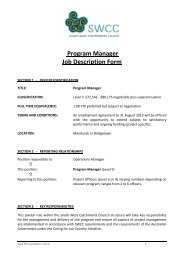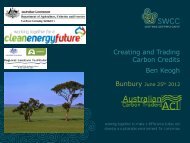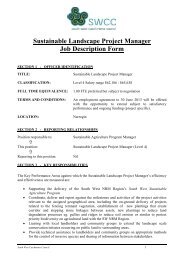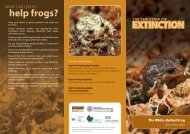- Page 1 and 2:
Consultancy Number 201010-001NRMS D
- Page 3 and 4:
DRAFT South West Regional NRM Strat
- Page 5 and 6:
DRAFT South West Regional NRM Strat
- Page 7 and 8:
DRAFT South West Regional NRM Strat
- Page 9 and 10:
DRAFT South West Regional NRM Strat
- Page 11 and 12:
DRAFT South West Regional NRM Strat
- Page 13 and 14:
DRAFT South West Regional NRM Strat
- Page 15 and 16:
DRAFT South West Regional NRM Strat
- Page 17 and 18:
DRAFT South West Regional NRM Strat
- Page 19 and 20:
DRAFT South West Regional NRM Strat
- Page 21 and 22:
DRAFT South West Regional NRM Strat
- Page 23 and 24:
DRAFT South West Regional NRM Strat
- Page 25 and 26:
DRAFT South West Regional NRM Strat
- Page 27 and 28:
DRAFT South West Regional NRM Strat
- Page 29 and 30:
DRAFT South West Regional NRM Strat
- Page 31 and 32:
DRAFT South West Regional NRM Strat
- Page 33 and 34:
DRAFT South West Regional NRM Strat
- Page 35 and 36:
DRAFT South West Regional NRM Strat
- Page 37 and 38:
DRAFT South West Regional NRM Strat
- Page 39 and 40:
DRAFT South West Regional NRM Strat
- Page 41 and 42:
DRAFT South West Regional NRM Strat
- Page 43 and 44:
DRAFT South West Regional NRM Strat
- Page 45 and 46:
DRAFT South West Regional NRM Strat
- Page 47 and 48:
DRAFT South West Regional NRM Strat
- Page 49 and 50:
DRAFT South West Regional NRM Strat
- Page 51 and 52:
DRAFT South West Regional NRM Strat
- Page 53 and 54:
DRAFT South West Regional NRM Strat
- Page 55 and 56:
DRAFT South West Regional NRM Strat
- Page 57 and 58:
DRAFT South West Regional NRM Strat
- Page 59 and 60:
DRAFT South West Regional NRM Strat
- Page 61 and 62:
DRAFT South West Regional NRM Strat
- Page 63 and 64:
DRAFT South West Regional NRM Strat
- Page 65 and 66:
DRAFT South West Regional NRM Strat
- Page 67 and 68:
DRAFT South West Regional NRM Strat
- Page 69 and 70:
DRAFT South West Regional NRM Strat
- Page 71 and 72:
DRAFT South West Regional NRM Strat
- Page 73 and 74:
DRAFT South West Regional NRM Strat
- Page 75 and 76:
DRAFT South West Regional NRM Strat
- Page 77 and 78:
DRAFT South West Regional NRM Strat
- Page 79 and 80:
DRAFT South West Regional NRM Strat
- Page 81 and 82:
DRAFT South West Regional NRM Strat
- Page 83 and 84:
DRAFT South West Regional NRM Strat
- Page 85 and 86:
Asset identifiable SMART goal possi
- Page 87 and 88:
DRAFT South West Regional NRM Strat
- Page 89 and 90:
DRAFT South West Regional NRM Strat
- Page 91 and 92:
DRAFT South West Regional NRM Strat
- Page 93 and 94:
DRAFT South West Regional NRM Strat
- Page 95 and 96:
DRAFT South West Regional NRM Strat
- Page 97 and 98:
DRAFT South West Regional NRM Strat
- Page 99 and 100:
DRAFT South West Regional NRM Strat
- Page 101 and 102:
DRAFT South West Regional NRM Strat
- Page 103 and 104:
DRAFT South West Regional NRM Strat
- Page 105 and 106:
DRAFT South West Regional NRM Strat
- Page 107 and 108:
DRAFT South West Regional NRM Strat
- Page 109 and 110:
DRAFT South West Regional NRM Strat
- Page 111 and 112:
DRAFT South West Regional NRM Strat
- Page 113 and 114:
DRAFT South West Regional NRM Strat
- Page 115 and 116:
DRAFT South West Regional NRM Strat
- Page 117 and 118:
DRAFT South West Regional NRM Strat
- Page 119 and 120:
DRAFT South West Regional NRM Strat
- Page 121 and 122:
DRAFT South West Regional NRM Strat
- Page 123 and 124:
DRAFT South West Regional NRM Strat
- Page 125 and 126:
DRAFT South West Regional NRM Strat
- Page 127 and 128:
DRAFT South West Regional NRM Strat
- Page 129 and 130:
DRAFT South West Regional NRM Strat
- Page 131 and 132:
DRAFT South West Regional NRM Strat
- Page 133 and 134:
DRAFT South West Regional NRM Strat
- Page 135 and 136:
DRAFT South West Regional NRM Strat
- Page 137 and 138:
DRAFT South West Regional NRM Strat
- Page 139 and 140:
DRAFT South West Regional NRM Strat
- Page 141 and 142:
DRAFT South West Regional NRM Strat
- Page 143 and 144:
DRAFT South West Regional NRM Strat
- Page 145 and 146:
DRAFT South West Regional NRM Strat
- Page 147 and 148:
DRAFT South West Regional NRM Strat
- Page 149 and 150:
DRAFT South West Regional NRM Strat
- Page 151 and 152:
DRAFT South West Regional NRM Strat
- Page 153 and 154:
DRAFT South West Regional NRM Strat
- Page 155 and 156:
DRAFT South West Regional NRM Strat
- Page 157 and 158:
DRAFT South West Regional NRM Strat
- Page 159 and 160:
DRAFT South West Regional NRM Strat
- Page 161 and 162:
DRAFT South West Regional NRM Strat
- Page 163 and 164:
DRAFT South West Regional NRM Strat
- Page 165 and 166:
DRAFT South West Regional NRM Strat
- Page 167 and 168:
DRAFT South West Regional NRM Strat
- Page 169 and 170: DRAFT South West Regional NRM Strat
- Page 171 and 172: Asset identifiable SMART goal possi
- Page 173 and 174: DRAFT South West Regional NRM Strat
- Page 175 and 176: DRAFT South West Regional NRM Strat
- Page 177 and 178: DRAFT South West Regional NRM Strat
- Page 179 and 180: DRAFT South West Regional NRM Strat
- Page 181 and 182: DRAFT South West Regional NRM Strat
- Page 183 and 184: DRAFT South West Regional NRM Strat
- Page 185 and 186: DRAFT South West Regional NRM Strat
- Page 187 and 188: DRAFT South West Regional NRM Strat
- Page 189 and 190: DRAFT South West Regional NRM Strat
- Page 191 and 192: DRAFT South West Regional NRM Strat
- Page 193 and 194: DRAFT South West Regional NRM Strat
- Page 195 and 196: DRAFT South West Regional NRM Strat
- Page 197 and 198: DRAFT South West Regional NRM Strat
- Page 199 and 200: DRAFT South West Regional NRM Strat
- Page 201 and 202: DRAFT South West Regional NRM Strat
- Page 203 and 204: DRAFT South West Regional NRM Strat
- Page 205 and 206: DRAFT South West Regional NRM Strat
- Page 207 and 208: Asset identifiable SMART goal possi
- Page 209 and 210: DRAFT South West Regional NRM Strat
- Page 211 and 212: DRAFT South West Regional NRM Strat
- Page 213 and 214: DRAFT South West Regional NRM Strat
- Page 215 and 216: DRAFT South West Regional NRM Strat
- Page 217 and 218: DRAFT South West Regional NRM Strat
- Page 219: DRAFT South West Regional NRM Strat
- Page 223: DRAFT South West Regional NRM Strat






